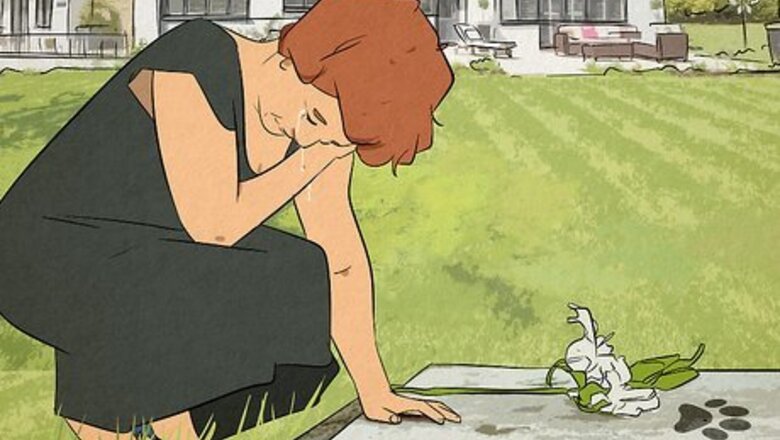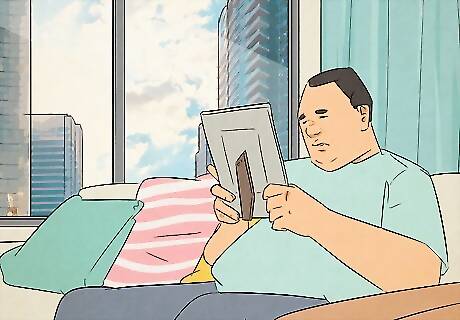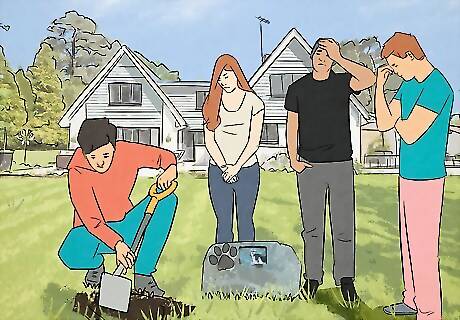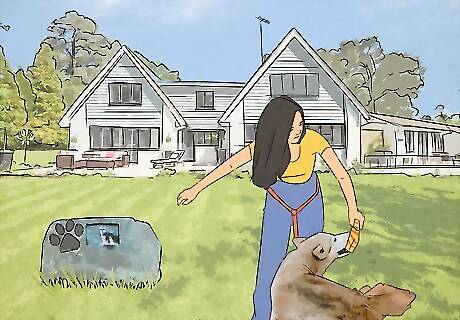
views
- Losing a pet is a deeply sad and upsetting experience. Crying and mourning for your beloved friend is completely valid and normal.
- Take around 8-10 deep breaths if you’d like to give yourself a break from crying. Distracting yourself by shifting your focus can also be helpful.
- Give yourself the time and space to feel your emotions, and share how you’re feeling with a trusted friend or loved one if you need it.
About the Grieving Process

Feelings like sadness, shock, and guilt are normal parts of grieving. It’s normal and okay to experience a variety of deep, painful emotions in the aftermath of your pet’s passing. You might feel a sudden sense of shock as you remember your pet is gone, or feel incredibly sad as you mourn your life without them. Some pet owners may even feel guilty for the way their pet’s life ended, and the role they played in their pet’s end-of-life care. The emotions of losing a pet can fall into the “Five Stages of Grief” model created by Elisabeth Kübler-Ross: denial, anger, bargaining, depression, and acceptance. You might experience these feelings in a completely different order, or only experience a couple of these emotions overall—it all depends on the individual. There isn’t a “right” or “wrong” way to feel after you lose a pet. Every person’s relationship with their pet is different, and every person’s grieving process is different, too.

There’s no set timeline for how long grief lasts. Because grief is such a personal process, there’s no easy way to predict how long it will last. Some people might start to feel okay after a few months, while others might experience it for much longer. No matter what, be patient and kind to yourself as you go on, and give yourself as much time as you need on your healing journey. If grief is still profoundly impacting your day-to-day life over a year after the fact, you might be experiencing complicated grief. In this event, a doctor or mental health professional can be a valuable source of support and solace.
Managing Grief After Pet Loss

Remind yourself that your grief is valid, normal, and okay. There’s absolutely nothing wrong or shameful about feeling heartbroken after the loss of a pet. People who choose to minimize your pain with words like “they’re just a cat/dog/etc.” don’t appreciate or understand the profound bond you shared with your pet. Grieving is a normal and unfortunately inevitable part of being a pet owner.

Give yourself permission to mourn in a way that feels authentic to you. Maybe you need some time to yourself while you cry in your bedroom, or maybe you find solace in looking at old pictures and videos of your pet. When it comes to loss, how you choose to grieve isn’t as important as simply giving yourself permission to do so in the first place. As tempting as it may be to push away the pain, denying yourself the chance to grieve will only hurt you and cause the pain to last longer. As devastating as it may feel at the moment, it’s better to heal in the here and now.

Take time to practice self-care. During such intense grief, it’s understandable if you let basic aspects of self-care fall to the wayside, like getting exercise, eating healthy meals, and following a sleep schedule. Be patient with yourself as you make time for these important tasks in your routine. Having trouble getting to sleep? Journaling, taking deep breaths, and practicing mindful meditation are just a few ways to soothe your mind and spirit before heading to bed each night.

Share your feelings with trusted friends and loved ones. There’s something undeniably powerful, validating, and healing about giving a voice to your grief. Ask a friend or loved one if you can vent about how you’re feeling, and share exactly what’s on your mind. Your friends and family can provide invaluable support during this difficult time. “I’m really struggling—it would’ve been Max’s 12th birthday today.” “Every time I think I’m doing better, I have a really awful day that puts me back to square 1. I just miss Buddy so much.”

Memorialize your pet with a special gesture. Honor your pet’s life by creating a special memento that honors all the special months and years you spent together. Creating this item gives you a chance to reflect and reminisce on all the lovely memories you had together. Here are a few ideas to help you get started: Make a scrapbook filled with pics and mementos of your pet Plant a tree in a park or field that your pet loved Frame a photo of your pet and hang it in your home Order a stuffed “clone” of your pet (via companies like Cuddle Clones or Petsies)

Host a service for your pet. If you plan on burying your pet, use this funeral as an opportunity to lay them to rest. If you’ve cremated your pet, take a moment to put their ashes in a special spot in your home. A service can be a touching opportunity for friends, family members, and even neighbors to share fond memories of your pet.

Find comfort with online support groups for bereaved pet owners. While in-person support groups aren’t common for grieving pet owners, online forums and chat rooms can be a great way to connect with others and share your profound loss. Here are a few resources to consider: Rainbow Bridge Grief Support Forum Rainbow Bridge Support Chat Grieving My Pet Facebook Group The Rainbow Bridge Pet Loss and Grief Support Facebook Group

Keep up a consistent routine. Having a daily routine to follow can make it easier to manage your grief on a day-to-day basis. Fill your routine with simple activities, like brushing your teeth, making breakfast, and doing laundry. Switching up your routine a bit can also be a helpful way to compensate for the time you used to spend with your pet (like going for a walk). Following a regular routine can be super helpful if you have other pets at home, too.
How do I stop crying after my pet dies?

Breathe deeply 8-10 times. Starting from your belly, breathe in and out multiple times in a row. Doing abdominal breathing helps kick your parasympathetic nervous system into gear, which helps put you in a more relaxed and peaceful state of mind. Feel free to try the 4-7-8 breathing method, too—this is when you breathe through your nose for a total of 4 seconds, hold that breath for a total of 7 seconds, and breathe out through your mouth for a total of 8 seconds.

Switch your focus to another task, even if it’s mundane. When you’re thinking about your beloved pet, it can be really difficult to get the tears to stop. With this in mind, try focusing on something specific that’s around you—you might read the label on a bag of chips, or count the number of vowels on a piece of mail. Distracting yourself effectively could get you a short break from the tears.

Ground yourself with a strong physical sensation. Focusing on a physical experience can help break you away from your sad and grieving thoughts, even if just for a moment. Try doing something like: Licking an ice cube Brewing a cup of coffee/tea and holding the warm part of the mug Pinching yourself without breaking your skin

Give yourself permission to cry if you feel the need to. Crying is a natural, healthy way for your body to process and release stressful emotions. When you don’t let yourself feel your feelings and cry, you can actually be at risk for a less effective immune system, hypertension, and other long-term health consequences. Practice self-compassion and give yourself the space and permission to process this traumatic experience by crying it out.
Why does pet grief hurt so much?

Pet grief hurts because it’s emotionally equivalent to losing a loved one. An extensive, well-researched review found that the grief felt by losing a pet is practically the same as the grief felt by losing a human loved one. Pets offer us a sense of unconditional love and companionship—when this beloved friend is no longer a physical part of your life, it’s understandable to feel grief-stricken and devastated.


















Comments
0 comment